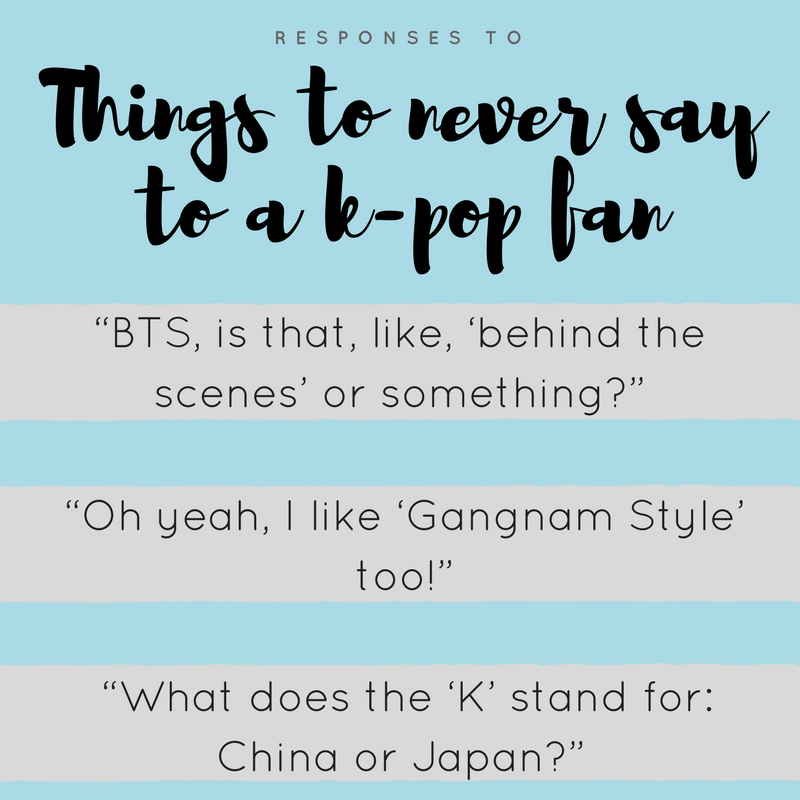Responses to things you should never say to a K-pop fan
When it comes to music, everyone has different tastes, and most genres appeal to certain groups of people more than to others. One of the first steps in understanding this concept of “different people, different taste” involves a basic level of understanding. K-pop, as a rising musical genre, is often misunderstood by non-fans, who often unintentionally offend fans with ignorant questions. So, to save you from ignorance and K-pop fans from frustration, here are responses to some common questions and comments about K-pop.
1. “What does the ‘K’ stand for: China or Japan?”
Because, you know, “K” obviously stands for Khina and Kapan. Just in general, assuming that every Asian is Chinese or Japanese is like thinking every Caucasian person is either British or American. There are lots of other Asian countries with their own unique music cultures and artists.
2. “Oh yeah, I like ‘Gangnam Style’ too!”
Psy’s eccentric “Gangnam Style” may be the most well-known K-pop song out there, but it definitely does not represent the whole genre. Just like in America, many pop artists actually incorporate different elements into their music to form their own distinct style. There are also multiple subgenres within K-Pop too, such as, K-Indie or K-R&B. Take IU’s “Palette,” BTS’s “Blood Sweat & Tears” or BlackPink’s “Boombayah,” for example.
3. “You can’t even understand what they’re saying, so why do you listen to their songs?
Music transcends language. For instance, “Despacito” recently exploded in popularity even amongst non-Spanish speakers, and many people enjoy classical or electronic music that includes no lyrics at all. And Rihanna’s “Work” is written fully in English, yet many people cannot discern the lyrics (except for the deeply meaningful “work, work, work, work, work, work”). However, because many song lyrics tackle issues like mental health, bullying, peer pressure and more, international fans often turn to social media to find translations.
4. “It’s like the Asian [insert a Western artist]!”
Or, maybe they are their own selves and not impersonations of other artists. Unless you label all humans with functional vocal chords under the same category, no two artists are the same. Aside from artists’ individual musical styles, K-pop typically places a much heavier emphasis on visuals than mainstream Western pop. K-pop music videos often have much higher production value, and singers spend countless hours—sometimes even going on for days with no sleep—to perfect their dance choreographies.
5. “What’s with the rainbow hair and bowl cuts?”
Again, different people, different preferences. Let the singers wear their hair however they want it. Bottom line? You dislike it and decide not to be a fan. This applies to everyone, not just K-pop artists. Besides, anyone who can pull off neon blue hair deserves some serious respect.
6. “How do you tell them apart?”
How do you tell a book apart from an orange? How do you tell tell your house apart from your neighbor’s? How do you tell your face apart from a camel’s? K-pop singers are all different people with different faces, different voices and different personalities. Just like with any other person, it might take you a while to remember the face, but that does not mean they all look the same. If they do to you, you should probably get your eyes checked.
7. “Why do the guys wear so much makeup?”
Makeup is a way to enhance looks, and like colors, clothing and shoes, does not have to be gendered. Western beauty standards tend to label makeup as feminine, so male celebrities tend to wear much lighter makeup than men in K-pop do—except K-pop is from Korea, which has a totally different set of beauty standards. Male singers in K-pop wear more makeup because it looks good to them (and also to millions of fans). In fact, many makeup brands have begun creating and marketing gender-neutral makeup products. There’s nothing wrong with guys wearing makeup, and we live in a day and age where men should be able to wear makeup and not be questioned for it.
8. “Is this North or South Korea?”
Now, you must be thinking, “What? No cultured soul would ever say something so preposterous!” You’d be surprised how often this exact question comes up. To all the unsure souls out there: South Korea. You know, the one that isn’t ruled by a dictator.
9. “They’re so untalented. I could do this.”
Great. Let’s all discredit them by ignoring the fact that they sing live while dancing in front of thousands of people, because that’s perfectly doable without any training at all. Actually, a lot more work goes into being artists than the flashy performances on camera. Members often produce and write their own songs, and some even help choreograph the dances. Prospective idols often train under entertainment companies from a young age in order to for a chance to debut. These people genuinely love what they do, and are willing to wait a decade to even begin thinking about the prospect of fame.
And, finally:
10. “BTS, is that, like, ‘behind the scenes’ or something?”
To the askers’ credit, this is a fairly common and understandable mistake. Still, to K-pop fans, it feels like when your mom texts “lol” at a completely inappropriate occasion because she thinks it means “lots of love,” or when someone thinks LGBT stands for “Let’s be gay together.” Again, this is Korean pop, which means the names are in Korean, not English. BTS originally stood for “Bangtan Sonyeondan,” which means “bulletproof boy scouts” (go ahead and laugh, but just know that they average 252,000 retweets per tweet). However, because so many people have mistaken it for “behind the scenes,” they recently officially rebranded their English name to Beyond The Scene. Thanks a lot, you guys.
So now you know. Many people love K-pop music, fashion and dance, and those people should not be judged for liking something that makes them genuinely happy and helps them get through difficult times in life. At the very least, just realize that K-pop—or anything else, really—cannot and should not be labelled solely based on Western standards. The world is more than the West, y’all.
In the wise words of Jenna and Meena (with a little twist), y’all just got JUNGSHOOKED.

Nina Gee (12) is the co-design editor for the Winged Post. This is her fourth year on the Harker Journalism staff. An aspiring filmmaker and avid storyteller,...
Helen Yang (12) is the Arts & Entertainment Columnist for Harker Aquila and Winged Post. She sees journalism as an opportunity to interact with and...


















![“[Building nerf blasters] became this outlet of creativity for me that hasn't been matched by anything else. The process [of] making a build complete to your desire is such a painstakingly difficult process, but I've had to learn from [the skills needed from] soldering to proper painting. There's so many different options for everything, if you think about it, it exists. The best part is [that] if it doesn't exist, you can build it yourself," Ishaan Parate said.](https://harkeraquila.com/wp-content/uploads/2022/08/DSC_8149-900x604.jpg)




![“When I came into high school, I was ready to be a follower. But DECA was a game changer for me. It helped me overcome my fear of public speaking, and it's played such a major role in who I've become today. To be able to successfully lead a chapter of 150 students, an officer team and be one of the upperclassmen I once really admired is something I'm [really] proud of,” Anvitha Tummala ('21) said.](https://harkeraquila.com/wp-content/uploads/2021/07/Screen-Shot-2021-07-25-at-9.50.05-AM-900x594.png)







![“I think getting up in the morning and having a sense of purpose [is exciting]. I think without a certain amount of drive, life is kind of obsolete and mundane, and I think having that every single day is what makes each day unique and kind of makes life exciting,” Neymika Jain (12) said.](https://harkeraquila.com/wp-content/uploads/2017/06/Screen-Shot-2017-06-03-at-4.54.16-PM.png)








![“My slogan is ‘slow feet, don’t eat, and I’m hungry.’ You need to run fast to get where you are–you aren't going to get those championships if you aren't fast,” Angel Cervantes (12) said. “I want to do well in school on my tests and in track and win championships for my team. I live by that, [and] I can do that anywhere: in the classroom or on the field.”](https://harkeraquila.com/wp-content/uploads/2018/06/DSC5146-900x601.jpg)
![“[Volleyball has] taught me how to fall correctly, and another thing it taught is that you don’t have to be the best at something to be good at it. If you just hit the ball in a smart way, then it still scores points and you’re good at it. You could be a background player and still make a much bigger impact on the team than you would think,” Anya Gert (’20) said.](https://harkeraquila.com/wp-content/uploads/2020/06/AnnaGert_JinTuan_HoHPhotoEdited-600x900.jpeg)

![“I'm not nearly there yet, but [my confidence has] definitely been getting better since I was pretty shy and timid coming into Harker my freshman year. I know that there's a lot of people that are really confident in what they do, and I really admire them. Everyone's so driven and that has really pushed me to kind of try to find my own place in high school and be more confident,” Alyssa Huang (’20) said.](https://harkeraquila.com/wp-content/uploads/2020/06/AlyssaHuang_EmilyChen_HoHPhoto-900x749.jpeg)



